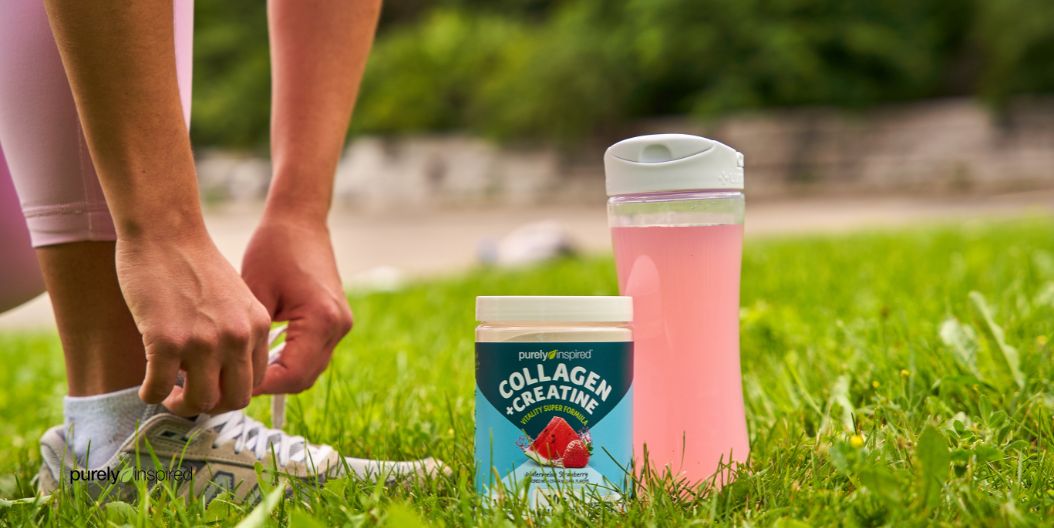Creatine is a popular supplement among athletes and fitness enthusiasts for ONE main reason: it works! Your muscles' creatine stores fuel high-intensity workouts. They aid in building muscle mass, and help you recover faster. But when is the best time to take creatine to maximize these benefits? Let's dive into the science behind creatine timing and dosing.
Creatine is one of the most widely researched and effective supplements. And it works positively for enhancing athletic performance and supporting muscle growth. By understanding the optimal timing and dosing of creatine, you can unlock its full potential.
Creatine is a naturally occurring compound found in our body. It plays a crucial role in the production of adenosine triphosphate (ATP). Which is the primary energy currency for your muscles.
By increasing the availability of phosphocreatine in your muscles, creatine supplementation can:
- Enhance high-intensity exercise capacity and power output
- Improve strength and muscle building
- Increase lean muscle mass
- Accelerate recovery between sets and workouts
Table of content
When to Take Creatine?
The time of taking creatine as well as the dosage, both affect the performance of Creatine. There are two main approaches to creatine supplementation:
- Loading Phase: This involves taking a higher dose (typically 20 grams per day) for 5-7 days. It rapidly saturates your muscle creatine stores. Split it into 4-5 smaller doses. This helps to rapidly saturate your muscles with creatine. It leads to faster performance and body composition benefits.
- Daily Maintenance Dosage: After the loading phase, a lower daily dose (3-5 grams) helps maintain the creatine stores. Daily Maintenance Dosage is typically taken at any time of day. This helps to maintain the elevated creatine levels in your muscles.
Also Read: What does Creatine do for Women?
Timing Around Workouts
The research on the ideal timing surrounding workouts is a bit mixed. Studies show no significant difference between pre-workout and post-workout timing. Some studies suggest taking creatine:
- Before exercise: This might top up creatine levels before your workout. It works for immediate access during high-intensity activities.
- After exercise: This could help replenish creatine stores used during your workout. This helps with faster recovery. As it allows your muscles to absorb the creatine when they are most receptive.
The key takeaway? Consistency is crucial. Pick a time that works for you and stick to it daily, regardless of your workout schedule.
Creatine for Every Training Phase
The beauty of creatine is its versatility. Whether you're bulking or cutting, creatine can be a valuable asset:
- Cutting Phase: During a calorie deficit, muscle loss can be a concern. Creatine can help preserve your hard-earned muscle. By optimizing creatine stores within your muscles. This allows you to maintain strength for a more sculpted physique.
- Bulking Phase: As you lift heavier weights and aim to build muscle mass, creatine can help you reach your goals faster. It ensures optimal creatine levels in your muscles. You can support improved performance during your workouts, potentially leading to greater gains in strength and size.
Also Read: Does Collagen Protein Build Muscle?
Rest Day Supplementation
Don't neglect creatine on rest days! Your muscles are still repairing and rebuilding. So maintaining consistent creatine levels is important for optimal recovery. This helps ensure your muscles are fully saturated. And it means you are ready to perform at your best during your next workout.
Creatine Dosing Recommendations
The optimal creatine dose can vary based on individual factors such as age, gender, and activity level:
- Age, Gender, and Activity Level: Generally, younger and larger individuals, or those engaged in high-intensity training, might benefit from slightly higher doses.
- Loading Phase vs. Maintenance Phase: As mentioned earlier, the loading phase requires a higher dose for a shorter period, followed by a lower maintenance dose.
Here's a general guideline to get you started (consult your doctor for personalized advice)
- Loading Phase (optional): 20 grams per day for 5-7 days, divided into 4-5 smaller doses.
- Maintenance Phase: 3-5 grams per day, taken consistently.
Generally, a loading phase of 0.3 grams per kilogram of body weight, followed by a maintenance phase of 0.03 grams per kilogram, is recommended.
Here are some tips for optimizing your creatine dosage based on your individual factors
1. Consider Your Body Weight
The recommended creatine dosage is often calculated based on your body weight. As a general guideline:
- Loading phase: 0.3 grams per kg of body weight, split into 4-5 doses per day
- Maintenance phase: 0.03 grams per kg of body weight per day
For example, a 150 lb (68 kg) individual would take:
- Loading phase: 20-25 grams per day (0.3 g/kg x 68 kg)
- Maintenance phase: 2-3 grams per day (0.03 g/kg x 68 kg)
Also Read: Why Take Collagen on Keto?
2. Adjust Based on Age and Gender
Younger individuals and males tend to benefit more from higher creatine doses compared to older adults and females. You may need to adjust the dosage accordingly:
- Younger adults (18-35 years): Use the standard dosage guidelines
- Older adults (over 35 years): Consider a slightly lower maintenance dose of 2-3 grams per day
- Women: May respond well to a slightly lower loading and maintenance dose
3. Activity Level and Exercise Goals
- If you engage in very high-intensity, anaerobic exercise like bodybuilding or powerlifting, you may benefit from the upper end of the recommended dosage range.
- For primarily aerobic activities like long-distance running, a lower maintenance dose of 2-3 grams per day may be sufficient.
4. Monitor Your Response
Pay attention to how your body responds to different creatine doses. Some individuals may respond better to a higher or lower amount. Keep a training journal to track changes in performance. You can also track body composition, and any side effects.
5. Be Patient and Consistent
It can take 2-4 weeks to fully saturate your muscle creatine stores. Stick with the same dosing protocol. For at least this long before evaluating its effectiveness.
Read Now: Does Collagen Make You Gain Weight?
6. Consult a Healthcare Professional
If you have any underlying health conditions or are taking medications, it's always wise to consult with a healthcare provider. Keep that in mind before starting or adjusting your creatine supplementation.
By taking the time to find your optimal creatine dosage, you can maximize the benefits.
7. Creatine Synergy
When strategically combined with other well-researched supplements, it can create a synergistic effect. Meaning the combined benefit is greater than the sum of its parts.
Here are two powerful creatine combos to consider:
- Creatine + Caffeine: This dynamic duo can be a game-changer for pre-workout performance. Studies suggest that moderate doses of caffeine (around 3-6mg/kg body weight) can enhance exercise performance. By improving power output, reducing fatigue, and even enhancing mental focus. The caffeine helps increase alertness and motivation. While the creatine provides readily available energy for your muscles to fire on all cylinders.
- Creatine + Beta-alanine: This combination tackles muscle fatigue during high-intensity workouts. Beta-alanine works by increasing your muscle carnosine levels, a molecule that buffers lactic acid buildup. Lactic acid accumulation is a major contributor to muscle fatigue. So by keeping it in check, beta-alanine allows you to push harder for longer. When combined with creatine you get a potent one-two punch against muscle fatigue. Allowing you to potentially experience greater gains in strength and endurance.
Before adding any new supplements to your routine, consult with a healthcare professional. So they can ensure they are safe for you and don't interact with any medications you're taking.
Remember, the foundation of any fitness journey is a balanced diet and proper hydration.
Creatine can be a powerful tool, but it's not a magic bullet.
- Hydration: Creatine draws water into your muscle cells. If you're dehydrated, this process can be compromised. Leading to potential side effects like cramps. Aim to drink plenty of water throughout the day, especially on workout days.
- Balanced Diet: Creatine supplementation can help you achieve your fitness goals faster. But it can't replace a healthy diet. Your body needs a variety of nutrients to function optimally and recover effectively. Focus on consuming enough protein to support muscle growth and repair. Include complex carbohydrates for sustained energy, and don't skimp on healthy fats for essential hormones and overall health.
By combining creatine supplementation with a balanced diet and proper hydration, you'll create an environment where your body can thrive. And maximize the benefits of your training efforts, regardless of your specific training phase.
Also Read: When Is the Best Time to Drink Greens?
Tracking Progress and Evaluating Effectiveness
The best way to see if creatine is working for you is to track your progress. Keep a workout journal to monitor. Your workout journal is your roadmap to success. Use it to meticulously record the following:
- Exercises: Document each exercise you perform, including sets, reps, and weight used. This allows you to progressively overload by gradually increasing weight. Or reps over time, a crucial factor in muscle growth and strength gains.
- Creatine Dosage: Track your daily creatine intake. Note the amount, timing (pre-workout, post-workout, etc.). And any changes you make throughout your training cycle.
-
Performance Metrics: This is where you measure the impact of your training and creatine. Record key performance metrics specific to your goals.
For weightlifters, this could be your one-rep maxes for various lifts. Runners might track their running times for specific distances.
Be sure to choose metrics that are relevant to your training program. To measure the effectiveness of your creatine supplementation, keep a workout journal. Track changes in your strength, power, and endurance. Additionally, monitor your body composition and any personal bests you achieve in your fitness activities.
Conclusion
Creatine timing research isn't conclusive, but consistency seems to be key. Take it daily, at a time that works for you. Experiment to see if pre-workout or post-workout timing feels better. Remember, the right dose depends on your individual needs and goals. Don't hesitate to consult your doctor for personalized advice.
By tracking your progress and making adjustments, you can discover the creatine routine that unlocks your full fitness potential!
By understanding the optimal timing and dosing of creatine, you can maximize the benefits of this powerful supplement! And take your fitness and athletic performance to new heights.



